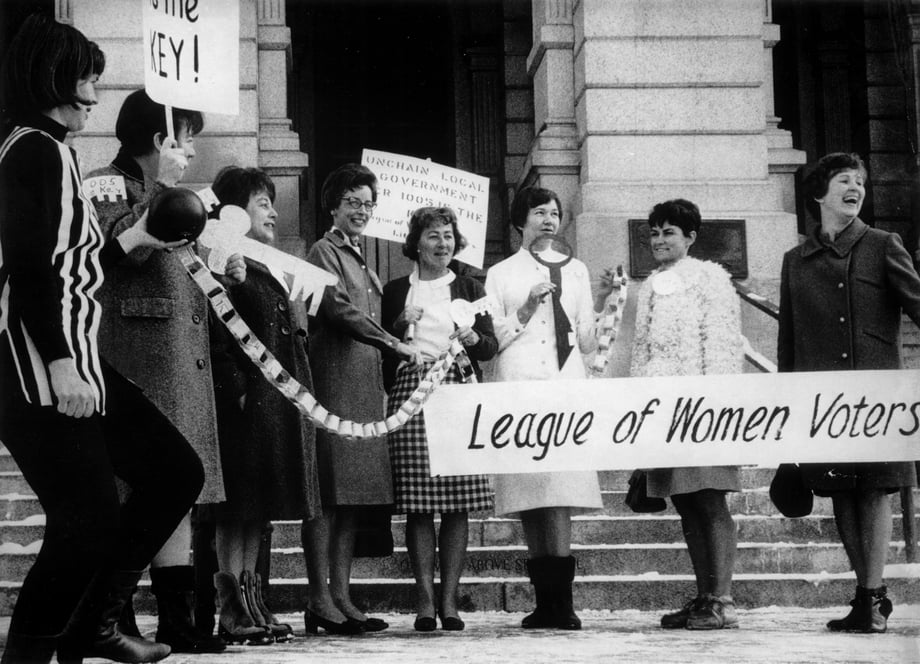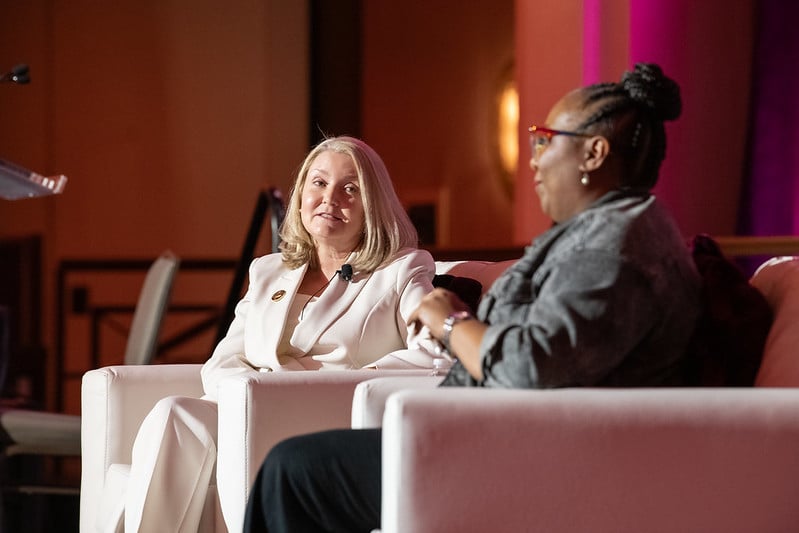Why We Will Remain the League of WOMEN Voters
Over a century after our founding — and the passage of the 19th amendment that granted many women the right to vote — some people question why the League of Women Voters keeps the word ‘women’ in our name. Why the continued focus on just half of the voting population? Doesn’t the League serve all voters, welcome members of all gender identities, and want everyone to participate in democracy? Doesn’t the League include men in our membership? If so, why do women need to stay front and center in our organization?
Stay Updated
Keep up with the League. Receive emails to your inbox!
These are all valid questions. Yet to me, now more than ever, it’s clear that “women” is an essential part of our name — and always will be. Women must remain persistent in our fight for equity and respect in a world we contribute to in a multitude of ways.
Women’s History Matters (and Should Not Be Erased)
From our nation’s founding until 1920, women were generally shunned from American politics and virtually invisible in our democracy. Laws and policies ensured that we were largely not seen and not heard. The founding of the League of Women Voters, by the very suffragists who fought for the passage of the 19th Amendment, is an important part of women’s history in this nation – and that history should never be erased.

Since our country was founded, women have suffered discrimination and faced challenges in making their voices heard due to our gender identity, sexuality, race, income level, age, first language, and more. This history and its ongoing consequences don’t just disappear with the passage of various voting rights acts. These are the injustices our country was built upon; their impact lives on in the nooks and crannies of our present-day reality. Reshaping that reality requires a steady drumbeat of declaring that women — all women — are important members of our democracy, and our priorities and perspectives must be heard and addressed. Women are an incredibly powerful portion of the electorate – and candidates and government officials at every level must remember that.
Even after the passage of the 19th Amendment, women of color faced substantial barriers to voting. Sadly, the history of discrimination is not just part of America’s history but also the League’s history. Early League leaders were not welcoming to women of color and poor women. And we acknowledge and continue to learn from that part of our history.
Political Representation is Far from Equal
Women remain underrepresented in elected office in proportion to our population. According to the Center for American Women and Politics, the 2024 election saw a dip in the number of women elected to Washington after multiple record-setting elections. In the Senate, only 25 women (or 25%) will serve in the 119th Congress while the US House will see 150 women representatives (34%). 2024 was the first time in our nation’s history that two Black women were elected to the Senate simultaneously.
Queer women also face low rates of political representation. Despite making up 6.5% of the adult population, the highest percentage of lesbian, gay, and bisexual members elected to Congress was only 2% (2 senators and 11 representatives) in 2023. The first trans woman to be elected to Congress, Sarah McBride, was just elected this past November, alongside several other historic LGBTQIA+ election winners. Clearly, our work is far from over; many women remain “invisible” in the American government today, and this must change.
Women continue to face numerous barriers to running for office. According to a 2023 Pew Poll, more than half of Americans believe that a significant obstacle to women seeking political office is that women must do more than men to prove themselves worthy. Other obstacles include gender discrimination, less support from party leaders and voters, family responsibilities, and sexual harassment.

Recent rollbacks to our reproductive freedoms further threaten to limit the civic engagement of women and people who experience pregnancy. As the late Dr. Deborah Ann Turner, a gynecologist and past LWVUS president, astutely stated:
“Unfortunately, decisions like [the overturning of Roe v. Wade] will only make it harder for those who can experience pregnancy to participate in politics. The medical, financial, and social demands of pregnancy, childbirth, and child-rearing (the latter of which still disproportionately impacts women) already make it challenging for women to participate in the workforce; running a political campaign or holding public office are just as, if not more, inaccessible.”
Organizations like the League of Women Voters empower women and fight to protect our freedoms so that we can become more fully represented in our democracy.
Electing more women to positions of power ensures that the issues that impact our daily lives receive the attention they deserve. From reproductive rights to maternal mortality rates, from pay equity to paid family leave, from domestic violence to missing and murdered Indigenous women, when women have political representation and are at the decision-making table, the nation benefits from robust discussions about the issues we care about. When women’s perspectives are excluded from the conversation, many of our most pressing issues fail to be adequately addressed – and that is harmful to society at large.
Women-Led Spaces are Sacred — and Few
The League began in 1920 as a “mighty political experiment” with the largest expansion of the electorate in American history and became a space for newly enfranchised women to share ideas, learn about elections and government, study issues vital to the nation, and develop our own leadership abilities.
Our name is at the heart of that mighty political experiment. It reinforces that our organization is a safe space for women to seek and exercise power, that we deeply understand the issues women face, and that we are prepared to defend our rights through advocacy, activism, and at the ballot box. By championing women voters, we aren’t diminishing the importance of individuals who identify differently; we are reinforcing that women also deserve a voice in our elections.

LWV President Dianna Wynn and CEO Celina Stewart, Esq.
The League has many members and supporters who do not identify as women, and their dedication to our mission is greatly appreciated and critical. In fact, our success requires strong allies willing to join us in this work, and the League welcomes all who value our principles.
Our name proclaims the power to tell our own stories—the stories of women’s experiences in American democracy. It acknowledges women’s history in this nation and how that history impacts us today. It signals that every space where League members gather, from offices to libraries to living rooms, is a space where women’s voices are uplifted and heard.
My grandmother struggled to put herself through college as a single mother to become a teacher because teaching was one of the few career paths open to her. I watched my mother face gender discrimination in her employment options. Over my lifetime, I have seen the gradual expansion of women’s rights, and I am now alarmed by the move away from gender equity.
Support our work to empower voters and defend democracy!
In these trying times when some seek to take power AWAY from women, it’s important to emphasize –including in our name – that women have fought for and deserve a voice at the ballot box and in our government.
To drop ‘women’ from our name does a disservice to those who came before us. We carry out their legacy as we advance democracy and voting rights into our second century. It also does a disservice to the women of today who are fighting for equality in every aspect of their lives, from political representation to equal pay to reproductive freedom.
I am proud to be part of an organization created and led by women. The League of Women Voters continues to celebrate and believe in the power of women to create a more perfect democracy. That hasn’t changed, and neither will our name.
The Latest from the League
We pulled US Census to get a snapshot of how women are voting. It made one thing clear: the next election is up to women.
See our map showing the power of women voters in 2022 and our graph on registered voters from 2004-2022 by the numbers.
For those who experience pregnancy, our basic freedoms hinge on our ability to make choices about our reproductive health. Our physical and psychological health, ability to gain and maintain employment, financial resources, and even what we can and cannot eat are all dependent on our reproductive choices.
It's 2022, and a Black woman has never held a seat on the Supreme Court. But with the retirement of Justice Stephen Breyer, that much-needed representation on the bench is coming closer to reality.
Sign Up For Email
Keep up with the League. Receive emails to your inbox!
Donate to support our work
to empower voters and defend democracy.





